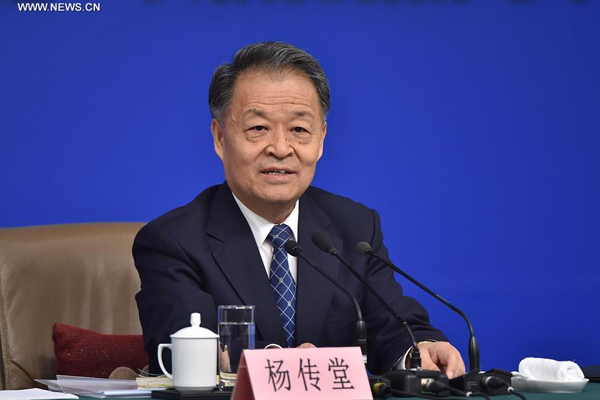


Chinese Minister of Transport Yang Chuantang attends a press conference on reform and development of taxi on the sidelines of the fourth session of the 12th National People's Congress in Beijing on March 14, 2016. [Photo: Xinhua]
China is set to license online car-hailing operators in an effective way and allow private cars to serve the public along with taxis.
Chinese Minister of Transport Yang Chuantang made the remarks at a press conference on the reform and development of taxis on the sidelines of the fourth session of the 12th National People's Congress.
Yang addressed the question concerning the passenger transport services provided by private cars through online car-hailing apps.
"If private car owners want to provide profitable services to the public, matters concerning passenger transport safety and public service will be involved and that has to be regulated by certain laws and regulations. In such a situation, we have to have corresponding supervision. According to the current guideline that we've drafted, we provide some approaches for private cars to serve as online car-hailing business. After being approved as operating vehicles through certain procedures, private cars will be allowed to undertake operational transport services."
Yang also notes that the subsidizing of fares and the supplementing of driver wages by ride-hailing companies such as Didi Kuaidi and U.S. firm Uber Technologies Inc. are competitively unfair and could not be sustained in the long-term.
Regulations governing the reform and development of the taxi market were also a hot topic at the press meeting.
Liu Xiaoming, head of Transport Service Department of the Ministry of Transport, says megacities and large cities must give priority to the development of public transport because they have limited road resources.
He says there should be overall control over taxi-operating rights. The move is to limit the total number of taxicabs so that they will have a proper share in the structure of transportation, instead of pursuing unlimited development.
"We have a well-defined direction for this reform: the taxi-operating rights must be free of charge and have limited durations. The purpose is to ensure taxi services will run in a virtuous manner and taxi operators will have to acquire the rights by providing quality service. This is a very important aspect of the current reform. Whether the operating rights will be cancelled or whether the quantitative control will be lifted will depend on the specific conditions of individual cities."
On another front, Guo Jifu, the director of Beijing Transportation Research Center, says taxi reform will focus on meeting the needs of those with physical disabilities.
"Taxis should not only meet the needs of local people in the cities, but also the outsiders including tourists and businessmen, especially senior citizens. We will pay closer attention to an important aspect of taxi reform - that is to let those who cannot move freely take barrier-free taxi services to realize their transport needs."
The Ministry of Transport also reveals that China will endeavor to put 200,000 clean energy buses into use across the country by 2020.
After three years of development, there have been more than 50,000 clean energy buses in cities such as Beijing, Shanghai, Jinan, Zhengzhou and Shenzhen.
 Beautiful Kapok flowers bloom in Hainan
Beautiful Kapok flowers bloom in Hainan Eye-catching beauties in Chunxi Road of Chengdu
Eye-catching beauties in Chunxi Road of Chengdu Wedding pictures of Wu Qilong, Liu Shishi released
Wedding pictures of Wu Qilong, Liu Shishi released One of world's largest military drills in Saudi Arabia
One of world's largest military drills in Saudi Arabia Iron lady or goddess? Sportswomen's dress show
Iron lady or goddess? Sportswomen's dress show Versatile female soldiers in military camp
Versatile female soldiers in military camp Top beauties in Chinese provinces
Top beauties in Chinese provinces Follow me to my Weibo
Follow me to my Weibo Chinese ships keep close watch on U.S. Navy aircraft carrier strike group in S. China Sea
Chinese ships keep close watch on U.S. Navy aircraft carrier strike group in S. China Sea Top 20 hottest women in the world in 2014
Top 20 hottest women in the world in 2014 Top 10 hardest languages to learn
Top 10 hardest languages to learn 10 Chinese female stars with most beautiful faces
10 Chinese female stars with most beautiful faces China’s Top 10 Unique Bridges, Highways and Roads
China’s Top 10 Unique Bridges, Highways and Roads Batman and Superman fight for the Chinese fans’ love... and their money
Batman and Superman fight for the Chinese fans’ love... and their money Locke denies US reviews target Chinese firms despite rise in probes
Locke denies US reviews target Chinese firms despite rise in probes Chinese surrogate buyers go on shopping sprees in Japan
Chinese surrogate buyers go on shopping sprees in Japan Trump opens Pandora’s box in US
Trump opens Pandora’s box in USDay|Week